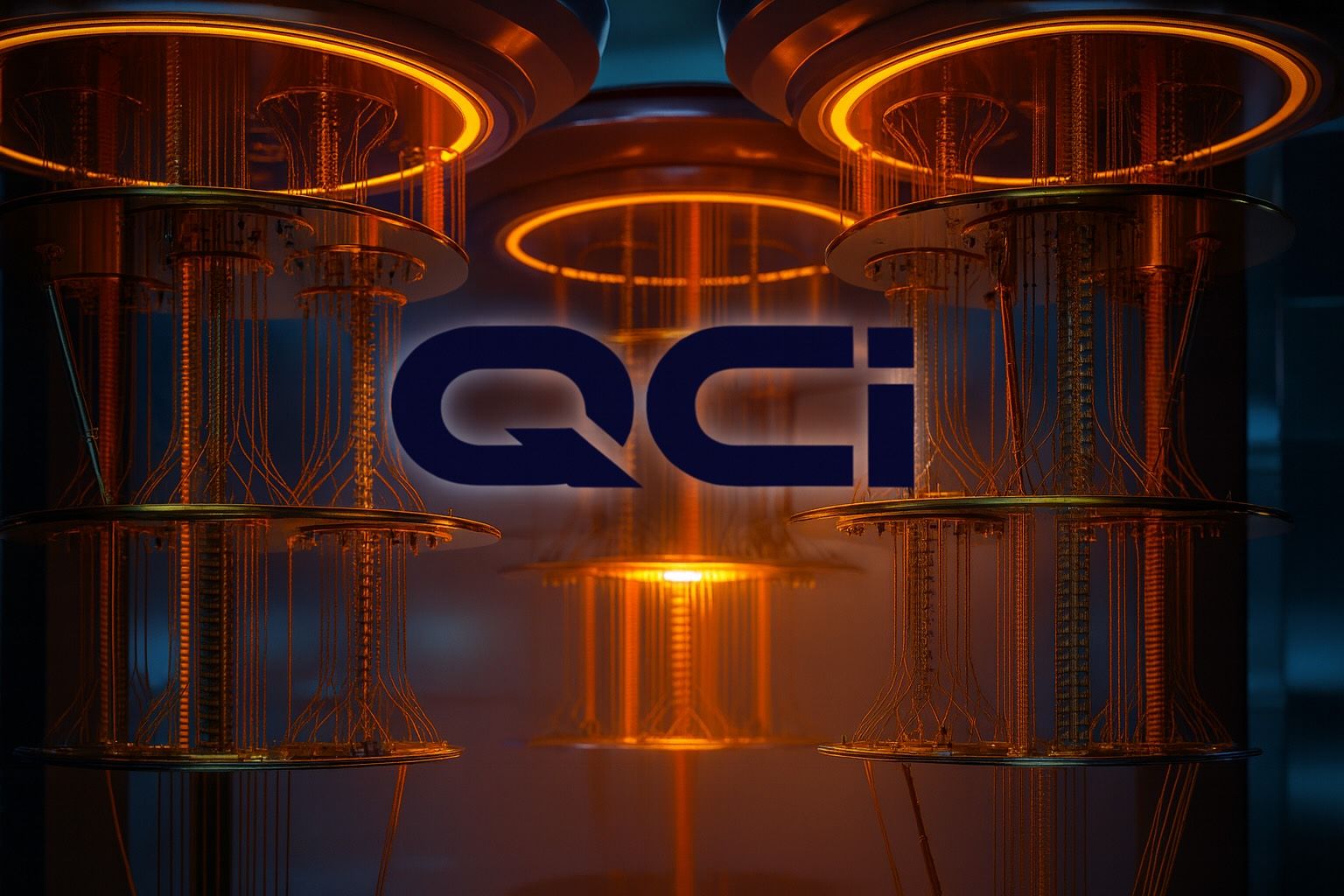Quantum computing stocks spent Monday, November 17, 2025 in classic high‑volatility mode. IonQ announced a new acquisition to deepen its quantum‑networking stack, Quantum Computing Inc. (QUBT) jumped after a surprise profit and new product reveal, Rigetti digested a big analyst upgrade, and D‑Wave slipped on heavy insider selling. At the same time, NVIDIA and Japan’s RIKEN unveiled new supercomputers built for AI and quantum workloads, underscoring how fast the broader ecosystem is maturing. NVIDIA Investor Relations+4BusinessWire+4F…
Below is a news‑driven rundown of what moved the main quantum computing names today—and what it could mean for investors watching this still‑early but increasingly crowded space.
Market snapshot: key pure‑play quantum stocks today
Prices and daily moves as of late trading on Monday, November 17, 2025:
- IonQ (NYSE: IONQ): $47.79, up about 1.3% on the day
- Rigetti Computing (NASDAQ: RGTI): $24.69, down about 3.1%
- D‑Wave Quantum (NYSE: QBTS): $22.83, down about 3.4%
- Quantum Computing Inc. (NASDAQ: QUBT): $11.50, up about 8.5%
All four remain dramatically above their 52‑week lows but have seen sharp pullbacks and large intraday swings, a pattern that has defined quantum computing stocks throughout 2025.CoinCentral+2StockAnalysis+2
IonQ (IONQ): Skyloom acquisition expands quantum‑networking ambitions
Today’s headline: IonQ to acquire Skyloom Global
The biggest company‑specific news in the quantum complex today came from IonQ, which announced a definitive agreement to acquire Skyloom Global, a U.S. leader in high‑performance optical communications used for satellite‑to‑satellite and satellite‑to‑ground laser links. BusinessWire
Key points from IonQ’s announcement:
- Skyloom has delivered nearly 90 optical communications terminals for U.S. Space Development Agency missions, demonstrating it can produce space‑qualified hardware at scale. BusinessWire
- IonQ says integrating Skyloom’s hardware could boost data throughput by up to 500% and cut latency for certain applications from “many hours to under one hour,” strengthening its quantum‑secure networking and distributed entanglement capabilities. BusinessWire
- The deal follows a string of acquisitions (Qubitekk, ID Quantique, Capella Space, Lightsynq) that have steadily pushed IonQ from being “just” a quantum computer maker toward a full‑stack quantum communications and sensing platform. BusinessWire+1
The transaction is expected to close after standard regulatory approvals and continues IonQ’s strategy of owning more of the quantum “plumbing” that will ultimately connect quantum computers, sensors, satellites, and classical networks. BusinessWire+1
Fundamental backdrop: strong growth, premium valuation
Recent coverage has emphasized just how aggressively the market has bid up IonQ:
- Over the last three years, IonQ shares have gained more than 600%, making it the most valuable pure‑play quantum computing stock. CoinCentral+1
- Q3 2025 revenue reached roughly $40 million, up about 222% year over year, beating analyst expectations and prompting the company to raise full‑year guidance to the high end of about $110 million in sales. BusinessWire+1
- IonQ has highlighted partnerships with AstraZeneca, NVIDIA, and Amazon demonstrating that its systems can accelerate a key drug‑discovery step by up to 20x compared with classical methods. CoinCentral+2Finviz+2
- Management has an ambitious roadmap to scale its systems to tens of thousands of logical qubits by 2030, potentially enabling commercially relevant fault‑tolerant quantum applications if the technology and funding both hold up. Finviz+2Wikipedia+2
Today’s modest share‑price gain suggests investors see the Skyloom acquisition as strategically positive but are also weighing it against already‑rich expectations after a huge multi‑year run and recent volatility in high‑growth tech.Yahoo Finance+1
Investor takeaway: IonQ increasingly looks like the “platform bet” in quantum computing—spanning hardware, software, and now orbital optical infrastructure. That breadth can support a premium valuation, but it also means execution risk is spread across several complex, capital‑intensive fronts.
Quantum Computing Inc. (QUBT): earnings beat, Neurawave launch send shares higher
Q3 2025: small numbers, big percentage moves
Quantum Computing Inc. (QUBT) was the biggest gainer among pure‑play quantum stocks today after reporting Q3 results on Friday and detailing an aggressive roadmap around its photonic technology. Fast Company+2Investing.com+2
Highlights from the latest quarter and follow‑up coverage:
- Revenue: About $384,000 in Q3 2025, up roughly 280% year over year and well ahead of estimates near $100,000. Fast Company+1
- Profitability swing: The company moved from a large net loss in Q2 to around $2.4 million in net income in Q3, though analysts note much of that reflects one‑time effects and capital‑structure changes rather than sustainable operating profits. Investing.com+1
- Cash and funding: A recent $1.5 billion capital raise has boosted QUBT’s cash balance to more than $550 million, giving it significant runway to fund R&D, manufacturing and potential acquisitions. Investing.com+1
Multiple outlets—from Fast Company to options‑focused research shops and financial portals—framed the report as a meaningful step toward industrial‑scale operations, while also underscoring just how speculative the name remains. Nasdaq+3Fast Company+3Schaeffers Investmen…
Neurawave: photonics‑based “reservoir computing” platform
What really lit up sentiment was the announcement of Neurawave, a photonics‑based reservoir computing system that Quantum Computing Inc. plans to showcase at SuperCompute25 in St. Louis this week. Investing.com+1
According to the company and independent analysis:
- Neurawave is designed as a PCIe card that can plug into standard servers, blending optical and digital electronics to deliver low‑power, room‑temperature acceleration for edge‑AI tasks like signal processing and time‑series forecasting. Investing.com+1
- Because it operates at room temperature, it sidesteps the cryogenic requirements of many quantum systems, potentially making it easier to deploy in industrial and field environments. Investing.com+1
- The company sees Neurawave as part of a broader strategy to combine integrated photonics, quantum‑inspired computing, and eventually quantum communication into commercially viable platforms. Investing.com+1
Stock reaction: a volatile climb
Intraday commentary showed:
- During the morning session, QUBT traded as high as about $12.01, up more than 13% from Friday’s close around $10.60. Investing.com+2Investing.com+2
- Options analysts noted that the strong move in QUBT helped pull sector peers IonQ and Rigetti higher earlier in the day, before broader volatility and profit‑taking reasserted themselves. Schaeffers Investment Research
- By late trading, QUBT had settled closer to $11.50, still up about 8.5% on heavy volume and leaving the stock with a roughly 275% one‑year return—despite having fallen sharply from its recent peak near $27. Investing.com+1
Investor takeaway: QUBT is a textbook example of what makes quantum computing stocks both fascinating and dangerous: very small absolute revenue, rapidly evolving technology (in this case, integrated photonics and reservoir computing), large cash reserves—and wild swings as investors react to each new data point.
Rigetti Computing (RGTI): analyst upgrade versus mixed fundamentals
While QUBT was surging, Rigetti Computing spent the day digesting a surprisingly bullish analyst revision against a backdrop of mixed Q3 numbers and sharp recent volatility. Ad Hoc News+1
Q3 scorecard and analyst response
A detailed European market summary of Rigetti’s latest quarter highlighted the following:
- Revenue: Around $1.95 million in Q3, an 18.1% year‑over‑year decline, missing top‑line expectations.
- Loss per share: A $0.03 loss, better than the $0.05 loss analysts were expecting, thanks to tighter cost controls. Ad Hoc News
- New business: Recent orders include $5.7 million for two Novera quantum systems and a separate $5.8 million contract from the U.S. Air Force Research Laboratory—signs of growing institutional interest. Ad Hoc News
- Cash and roadmap: With roughly $600 million in cash, Rigetti believes it has enough runway to build a system exceeding 100 qubits by the end of 2025 and target systems with 1,000+ qubits by 2027. Ad Hoc News
The big twist today was Cantor Fitzgerald substantially improving its full‑year 2025 earnings forecast, cutting its projected loss from $0.29 per share to $0.16 per share, a notably more optimistic stance than earlier in the year. Other firms like Benchmark and B. Riley remain cautious or neutral, illustrating divided sentiment on Wall Street. Ad Hoc News
Stock performance and volatility
Rigetti’s share price tells the story of investor indecision:
- Through early November, RGTI had gained roughly 150% year‑to‑date, riding the broader enthusiasm in quantum names. CoinCentral+1
- Over the last 30 trading days, however, the stock has fallen more than 40%, reflecting concerns over its ability to translate technical progress into durable revenue growth. Ad Hoc News
- Today, shares closed around $24.69, down about 3.1%, even as the improved earnings outlook and new contracts gave bulls something to cheer. Ad Hoc News
Investor takeaway: Rigetti sits at the intersection of strong technical ambition and choppy execution. The upgraded outlook suggests a better‑managed cash burn, but slowing revenue growth, intense competition, and recent share‑price whiplash mean this remains a high‑beta, high‑risk name.
D‑Wave Quantum (QBTS): insider selling pressures the stock
D‑Wave Quantum, the primary public champion of quantum annealing rather than gate‑based systems, came under pressure today following significant insider selling by top executives. MarketBeat+1
What happened
MarketBeat’s instant alert on Monday flagged multiple large transactions from senior leadership: MarketBeat
- CFO John Markovich sold about 98,060 shares at an average price of roughly $23.17, trimming his holdings by just over 6%.
- CEO Alan Baratz sold about 168,102 shares at similar prices, plus a separate sale of 806,288 shares at about $28.87, reducing his stake by more than 20%.
- Following these trades, both executives still retain substantial ownership, but the size of the sales naturally raised investor eyebrows.
At the same time, D‑Wave’s fundamentals show a mix of progress and ongoing risk:
- Recent quarterly results showed revenue of about $3.74 million, up over 100% year‑over‑year, and an earnings loss of $0.05 per share, better than expectations of a $0.07 loss. MarketBeat
- However, margins and return on equity remain deeply negative, consistent with its early‑stage, R&D‑heavy profile. MarketBeat
Market reaction
- Mid‑day, D‑Wave shares were down around 3.6%, trading near $22.77 versus a prior close of $23.61. MarketBeat
- By late trading, the stock hovered around $22.83, roughly in line with those levels.
- Analysts still rate the stock a “Moderate Buy” with a consensus price target close to $28.67, implying upside from current levels if execution continues to improve. MarketBeat
Investor takeaway: Insider selling doesn’t automatically signal trouble—executives diversify for many reasons—but large, clustered disposals after a big run‑up can amplify volatility and make new buyers more cautious, especially in a company still far from consistent profitability.
Sector‑level catalyst: NVIDIA & RIKEN’s new AI + quantum supercomputers
Beyond individual stocks, today also brought important infrastructure news that matters for the long‑term quantum story.
NVIDIA announced that Japan’s national research institute RIKEN is building two new supercomputers, one focused on AI for science and another on quantum computing research, both powered by NVIDIA’s GB200 systems and Quantum‑X800 InfiniBand networking. NVIDIA Investor Relations+1
Key details:
- The systems will deploy 2,140 NVIDIA Blackwell GPUs in total—around 1,600 GPUs for the AI‑focused machine and 540 GPUs for the quantum‑oriented one. NVIDIA Investor Relations
- The quantum system will support research into quantum algorithms, hybrid quantum‑classical methods, and simulations—precisely the kinds of workloads that could eventually run on or alongside future hardware from companies like IonQ, Rigetti, and D‑Wave. NVIDIA Investor Relations
- NVIDIA and RIKEN frame this as a step toward a unified platform for HPC, AI, and quantum, a direction that could favor companies designing quantum systems to work tightly with classical accelerators. NVIDIA Investor Relations
While this announcement doesn’t directly change the economics of any single quantum stock today, it underscores a key theme: successful quantum platforms will likely live inside hybrid, GPU‑rich data centers, not as isolated black‑box machines.
Policy backdrop: U.S. considering direct equity stakes in quantum firms
In the background of today’s price moves, investors are still watching Washington, where reports in late October suggested the U.S. government is exploring taking small equity stakes in several quantum‑computing firms, including IonQ, Rigetti, and D‑Wave, in exchange for at least $10 million in funding per company. The Quantum Insider
The proposal—still not finalized—would mark a rare shift toward direct federal ownership of cutting‑edge tech companies. For quantum stocks, that kind of support could:
- Provide additional capital for R&D and manufacturing;
- Increase regulatory and oversight complexity;
- Potentially affect future takeover or partnership dynamics.
Investors following today’s news are weighing company‑specific developments (like IonQ’s Skyloom deal or QUBT’s Neurawave launch) against this evolving policy environment.
What today’s moves mean for quantum‑computing investors
Pulling the threads together, here’s how the November 17, 2025 news flow looks from an investment‑strategy perspective:
- Leaders are trying to own the full stack.
IonQ is rapidly bolting on networking and space‑communications capabilities, while QUBT is leaning into integrated photonics and edge‑AI hardware. That pushes them beyond pure research labs toward complete platforms—and raises both potential upside and execution risk. BusinessWire+2Investing.com+2 - Revenue is still tiny relative to valuations.
Across the board, quarterly revenues are measured in hundreds of thousands to low millions of dollars, yet market caps range into the billions. That disconnect means share prices are driven more by expectations about 2030+ than by current cash flows. StockAnalysis+3Fast Company+3Investing.com… - Volatility is a feature, not a bug.
Double‑digit daily moves in QUBT, multi‑week swings of 40%+ in RGTI, and 3–4% reactions to insider sales at D‑Wave underline that these are still speculative instruments. Position sizing and time horizon matter much more here than in mature sectors. Ad Hoc News+2Schaeffers Investment Researc… - The ecosystem is becoming more hybrid.
NVIDIA’s RIKEN collaboration and Neurawave’s PCIe form factor both point toward hybrid quantum‑classical architectures that plug into existing data‑center and edge‑compute setups, rather than replacing them. NVIDIA Investor Relations+1 - Policy and funding can move sentiment quickly.
The prospect of U.S. government equity stakes, large private capital raises, and ongoing strategic partnerships with cloud and pharma giants all reinforce that quantum computing sits at the nexus of industrial policy, venture capital, and corporate R&D. Investing.com+3The Quantum Insider+3Busine…
FAQs: Quantum computing stocks on November 17, 2025
Which quantum stock moved the most today?
Among the main U.S. pure‑plays, Quantum Computing Inc. (QUBT) posted the largest percentage gain, rising roughly 8–13% intraday on its Q3 earnings beat and Neurawave announcement. Investing.com+1
What was the biggest corporate announcement?
The most significant strategic move was IonQ’s agreement to acquire Skyloom Global, which adds space‑qualified optical communications hardware to its quantum‑networking ambitions and continues its shift toward a full‑stack platform. BusinessWire
Are analysts generally bullish or bearish on quantum stocks right now?
Sentiment is cautiously bullish but fragmented:
- D‑Wave carries a “Moderate Buy” consensus with a target above today’s price. MarketBeat
- Rigetti just received a notably improved earnings outlook from Cantor Fitzgerald, but other firms remain neutral. Ad Hoc News
- IonQ is widely seen as a leader but flagged as richly valued and highly volatile in multiple analyses. CoinCentral+2Finviz+2
- QUBT has “Strong Buy” style ratings at some data providers but also a history of sharp drawdowns. StockAnalysis+2Nasdaq+2
Final word (and a quick disclaimer)
Quantum computing stocks are speculative, long‑duration bets on technologies that may not reach full commercial maturity for years. The news on November 17, 2025—IonQ’s Skyloom deal, QUBT’s earnings pop and Neurawave reveal, Rigetti’s analyst upgrade, D‑Wave’s insider selling, and NVIDIA’s RIKEN partnership—underscores both the enormous potential and the considerable risk embedded in this theme. NVIDIA Investor Relations+4BusinessWire+4I…
This article is for information and education only and is not financial advice. Before buying or selling any of these stocks, consider your risk tolerance, time horizon, diversification, and whether you can withstand large drawdowns in a very volatile corner of the market.









